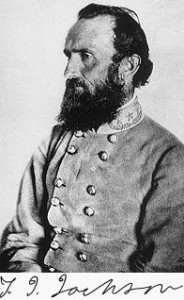 Union General Ulysses S. Grant, now in command of all Union armies, plots strategy for the coming spring and summer campaigns. Today in Cincinnati Grant wraps up a planning session with General William Tecumseh Sherman in which they discuss putting all federal armies into play simultaneously, engaging the rebels on all major fronts in an attempt to thwart all of the Confederates’ objectives.
Union General Ulysses S. Grant, now in command of all Union armies, plots strategy for the coming spring and summer campaigns. Today in Cincinnati Grant wraps up a planning session with General William Tecumseh Sherman in which they discuss putting all federal armies into play simultaneously, engaging the rebels on all major fronts in an attempt to thwart all of the Confederates’ objectives.
After their meeting concludes, Grant turns toward Washington, while Sherman heads back south to Nashville to put the finishing touches on his planned march through Georgia, an offensive designed to break the backbone of the rebellion.
While Grant and Sherman plot strategy, the western federal offensive moving up Louisiana’s Red River continues. The goal is Shreveport and, from there, eastern Texas.
As the Union looks forward to victory, some in the Confederacy are gazing backward with wistfulness to the memory of a former Confederate general. Now in the process of being sainted by the South’s evangelical white Christians, including Baptists, former General Thomas “Stonewall” Jackson is more legendary in death than he was in the months prior to his death, if that is possible.
A Presbyterian in adulthood, in his youth Jackson had attended a Baptist church where he read the Bible and became enamored with the battles depicted in the Old Testament. Some credit the general’s brilliant military successes earlier in the war with that which he learned from the Good Book.
Now deceased, Jackson’s journey to sainthood is covered by Southern Baptist newspapers. In the current week’s Georgia Baptist Christian Index, a Baptist army missionary relates a first-hand account of a lecture about the general that took place in the army camps in February.
Monday, Feb. 22d. I went to Davis’ brigade this morning to hear a lecture from the Rev. B. T. Lacy on “The Life and christian character of Gen. T. J. Jackson.” The lecturer was well prepared for his task by his intimate association with the lamented hero, and for two hours he enchained the audience which, far too large for the chapel, assembled out in the open air. It was a fit and eloquent tribute to a great and good man. After the lecture I received three others [for baptism] for Davis’ brigade and one from Wright’s, and we repaired to a mill pond near by where some of the brethren had cut off the ice from a space sufficient for our purpose. We sang an appropriate hymn, earnest prayer was offered and appropriate passages of scripture read, and, in the presence of a large and solemn congregation, I “went down into the water” and “buried with Christ in baptism” the fourteen young brethren whom I had received.
Thus, merely by hearing about the life of the former general, some soldiers are moved to give their lives to Christ and be baptized in a freezing pond in the middle of the winter.
Sources: “This Day in the American Civil War,” March 23, 1864 (link); “Stonewall Jackson,” StonewallCountry.com (link); W., “Army Correspondence to the Index,” Christian Index, March 18, 1864


